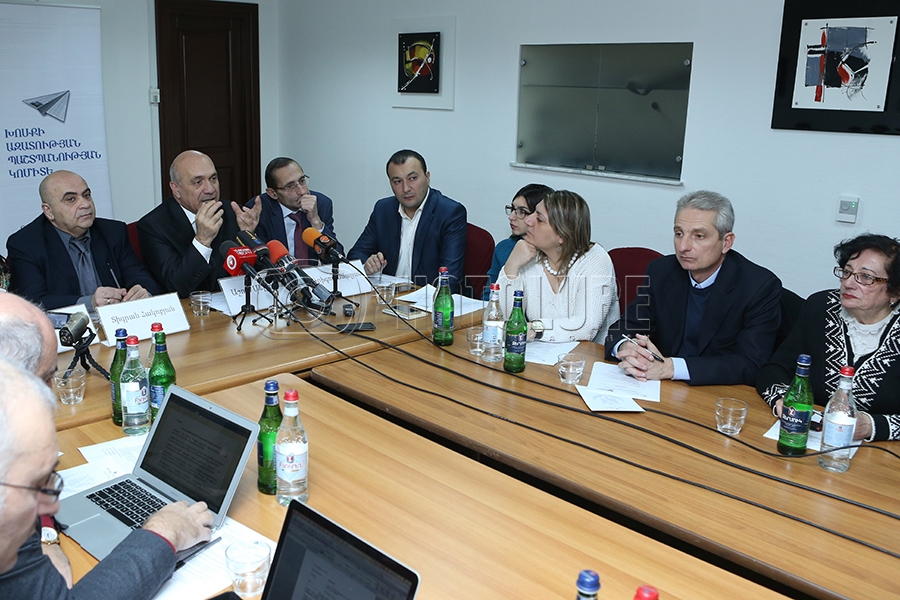On November 23, the Committee to Protect Freedom of Expression with the assistance of the Open Society Foundations – Armenia organized a roundtable on the Challenges for Armenian Regional TV Broadcasters in the Light of Recent Transition to Digital TV Broadcasting. The urgency of this discussion was created by the fact that the termination of analogue TV broadcasting during the week of October 20-26 by the national TV channels led to a situation where 11 regional and local TV broadcasters rapidly lost most of their audience and advertisers and appeared on the thin edge of bankruptcy.
In his opening speech the Chairman of the Committee to Protect Freedom of Expression (CPFE) Ashot Melikyan reminded the participants that during the recent years the Committee and fellow journalist organizations have repeatedly warned the society about this danger, however those warnings were unfortunately ignored, and today the society is facing the need to take urgent measures for rescuing regional and local TV companies. He said that the December 18, 2015, amendments to the RA Law on Television and Radio did not improve the situation, but only made it worse. Although TV broadcasters were given the opportunity to continue analogue broadcasting until introduction of the private multiplex, the tender announced earlier in this year was cancelled because of the absence of bids, while the analogue broadcasting, as mentioned above, was discontinued despite this circumstance. Naturally, in these conditions the TV companies will most likely close-up before the idea to introduce a private multiplex in the local market becomes a reality.
The CPFE Chairman informed the participants that he had a number of meetings with responsible officials to discuss the current situation in the sector and to find possible solutions. Two draft laws were submitted to the National Assembly, but an official from the Standing Committee of the National Assembly on Science, Education, Culture, Youth and Sport declared that the proposed bills represent a major legislative change and as such can be adopted only after upcoming parliamentary elections. “The local TV companies are already losing their audience; if we wait until the end of parliamentary elections we will most likely find them broke by that time”, said Ashot Melikyan and added that an intermediate solution is required by the time of elections, such as admitting the local TV companies into the public digital network until the necessary legislative amendments are made and the private multiplex is introduced.
The General Director of the Armenian Television and Radio Network CJSC Grigor Amalyan said that technically it is possible to include the local TV companies in the public digital network. All you need for that is some additional equipment. “If the National Legislative decides to integrate the local TV companies into the digital network, we will be able to do that since the capacity of our regional transmitters allows us to do that; simply we will have to suppress the HD format of the national TV broadcasters in the regions for a while”, said Grigor Amalyan. At the same time, Mr. Amalyan said that this intermediate solution should not be applied for a long period of time, since this will reduce the attractiveness of the sector for private multiplexes and the chances for this business will decrease; after all the TV companies are their potential clients. Grigor Amalyan also mentioned that integration to the public digital network will imply some extra costs which have to be properly justified and conditioned.
The Director of Lori TV Company Narine Avetisyan said that she studied the international experience on this matter, particularly, the challenges for TV companies around the world on the way to digitization, and couldn’t find a precedent where a TV company would face the risk of liquidation due to the process of digitization. She said that with sufficient political will in place all the problems of the Armenian TV broadcasting sector could be well solved. “I still believe that we are living in a democratic state, and that in the 21st century the closure of a regional private TV company will not be tolerated”, she said.
The newly elected member of the NCTR (National Commission for Television and Radio) Tigran Hakobyan assured that there is no political decision for closing the regional TV companies. “And this is not because we have so freedom-oriented and freedom-of-speech-protecting government, but rather because the authorities do not see any danger in regional TV companies”, said Mr. Hakobyan. The Member of the NCTR said that a package with practical and clear proposals should be compiled and an intermediate solution for saving the regional TV companies should be found before the end of the upcoming parliamentary elections.
Regional and local TV company managers participating in the discussion expressed their concerns about the uncertainty in the sector. In their opinion the entry of a private multiplex in the local market is going to be very difficult, since almost all the operating TV companies are currently in the public network. Only the regional and local TV companies are outside that network and as such without any possibility to broadcast in digital format. Hence, it is hard to believe that a big private countrywide multiplex will be established only to cover the needs of these TV companies.
The Director of the Media Initiatives Center Nune Sargsyan agreed with the point that the idea of establishing a big private multiplex, no matter how desirable it is, cannot become a reality. “From the technical perspective all the issues have been resolved; so who will use the services of the private multiplex, especially considering the size of required investments and the associated cost of the services for private TV companies?”, said Nune Sargsyan and reminded the participants about the Georgian example, where private multiplexes successfully entered the market because the public multiplex is used to broadcast only the Public Television; the rest use private multiplexes. To resolve the problem of regional and local TV companies in Armenia a working group should be established and all the stakeholders should be given equal rights. “If later a TV company choses to close, it will be its own choice”, said Nune Sargsyan.
The sector specialists declared that although the representatives of state authorities during all such discussions assure the participants that there is no political decision to close the regional and local TV companies, the decisions, regulations and laws adopted by them obviously create an environment where these TV companies cannot survive; such an approach is not acceptable. Ashot Melikyan informed the forum that the problem had been raised also at a meeting in the Office of the President. A promise was given to find concrete solutions to this problem in the upcoming 10 days. “Time will show what will happen in reality. As for us, we continue to insist that major legislative changes are needed to bring about real improvements in the sector. However, since the authorities say this will be possible only after the upcoming parliamentary elections, a temporary solution will be needed. More specifically, temporary contracts should be signed with regional and local TV companies for giving them access to the public digital broadcasting network until the introduction of the private multiplex”, said Ashot Melikyan. The CPFE Chairman mentioned that this is the only way to save these TV companies, and that the Committee will use all legal forms of struggle to achieve this.
Lilit Hovhannisyan












